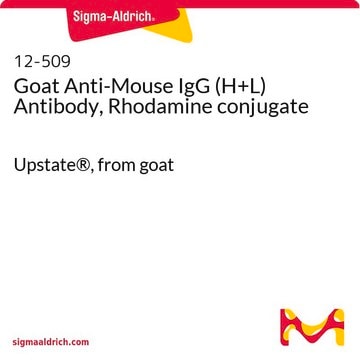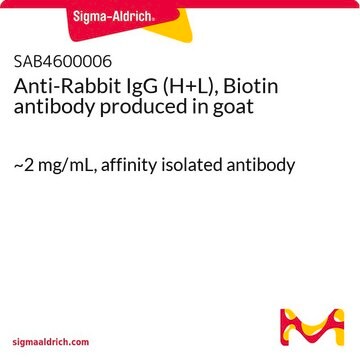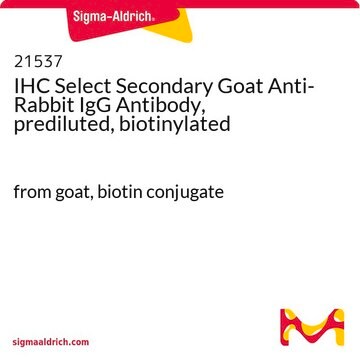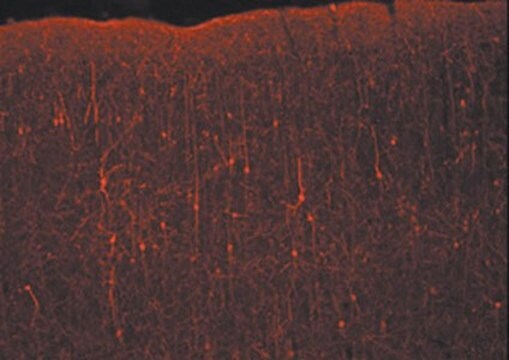AP307R
Goat Anti-Rabbit IgG Antibody, (H+L) Rhodamine conjugate
1.0 mg/mL, Chemicon®
Sign Into View Organizational & Contract Pricing
All Photos(1)
About This Item
UNSPSC Code:
12352203
eCl@ss:
32160702
NACRES:
NA.46
Recommended Products
biological source
goat
Quality Level
conjugate
TRITC conjugate
rhodamine conjugate
antibody form
affinity purified immunoglobulin
antibody product type
secondary antibodies
clone
polyclonal
species reactivity
rabbit
manufacturer/tradename
Chemicon®
concentration
1.0 mg/mL
technique(s)
immunofluorescence: suitable
shipped in
wet ice
target post-translational modification
unmodified
General description
The reagent is an affinity purified antibody from goat. The purified antibody is conjugated to rhodamine and stabilized in buffer.
Specificity
Specific for rabbit IgG, heavy and light chain. The cross-reactivities of anti-rabbit IgG antibody are tested in an ELISA. Minimum cross-reactivity to human IgG.
Application
Immunohistochemistry: 1:200-1:500 (1-4)
Immunocytochemistry: 1:200-1:500 (1,4)
Flow Cytometry: 1 μg per 1x10E6 cells (1,2,4)
Optimal working dilutions must be determined by the end user.
Immunocytochemistry: 1:200-1:500 (1,4)
Flow Cytometry: 1 μg per 1x10E6 cells (1,2,4)
Optimal working dilutions must be determined by the end user.
Research Category
Secondary & Control Antibodies
Secondary & Control Antibodies
Research Sub Category
Whole Immunoglobulin Secondary Antibodies
Whole Immunoglobulin Secondary Antibodies
This Goat anti-Rabbit IgG Antibody, (H+L) Rhodamine conjugate is validated for use in IF for the detection of Rabbit IgG.
Physical form
F/P MOLAR RATIO:
2-3
2-3
ImmunoAffinity Purified
Storage and Stability
The undiluted antibody is stable at 2-8°C for 12 months. Do not store in a diluted format.
Legal Information
CHEMICON is a registered trademark of Merck KGaA, Darmstadt, Germany
Disclaimer
Unless otherwise stated in our catalog or other company documentation accompanying the product(s), our products are intended for research use only and are not to be used for any other purpose, which includes but is not limited to, unauthorized commercial uses, in vitro diagnostic uses, ex vivo or in vivo therapeutic uses or any type of consumption or application to humans or animals.
Not finding the right product?
Try our Product Selector Tool.
Storage Class Code
12 - Non Combustible Liquids
WGK
WGK 2
Flash Point(F)
Not applicable
Flash Point(C)
Not applicable
Certificates of Analysis (COA)
Search for Certificates of Analysis (COA) by entering the products Lot/Batch Number. Lot and Batch Numbers can be found on a product’s label following the words ‘Lot’ or ‘Batch’.
Already Own This Product?
Find documentation for the products that you have recently purchased in the Document Library.
Vanina A Netti et al.
Biomedicine & pharmacotherapy = Biomedecine & pharmacotherapie, 81, 225-234 (2016-06-05)
Aquaporin-1 (AQP1) is expressed in the heart and its relationship with NO system has not been fully explored. The aims of this work were to study the effects of NO system inhibition on AQP1 abundance and localization and evaluate AQP1
BAALC, the human member of a novel mammalian neuroectoderm gene lineage, is implicated in hematopoiesis and acute leukemia.
Tanner, SM; Austin, JL; Leone, G; Rush, LJ; Plass, C; Heinonen, K; Mrozek, K; Sill et al.
Proceedings of the National Academy of Sciences of the USA null
B Yang et al.
Neoplasma, 60(3), 254-261 (2013-02-05)
The purpose of this study was to evaluate the association of expression level of α5β1-integrin and MMP-14 with clinicopathologic features and prognosis in colorectal cancer (CRC). The expressions of α5β1-integrin and MMP-14 in normal colorectal mucosa and CRC tissue were
Lok-Yin Roy Wong et al.
Journal of immunology (Baltimore, Md. : 1950), 205(6), 1564-1579 (2020-08-05)
Middle East respiratory syndrome coronavirus (MERS-CoV) is a highly pathogenic human coronavirus causing severe disease and mortality. MERS-CoV infection failed to elicit robust IFN response, suggesting that the virus might have evolved strategies to evade host innate immune surveillance. In
Fei Gao et al.
Reproduction (Cambridge, England), 148(4), 377-387 (2014-07-18)
The Wilms' tumour 1 (WT1) gene originally identified as a tumour suppressor associated with WTs encodes a zinc finger-containing transcription factor that is expressed in multiple tissues and is an important regulator of cellular and organ growth, proliferation, development, migration
Our team of scientists has experience in all areas of research including Life Science, Material Science, Chemical Synthesis, Chromatography, Analytical and many others.
Contact Technical Service






